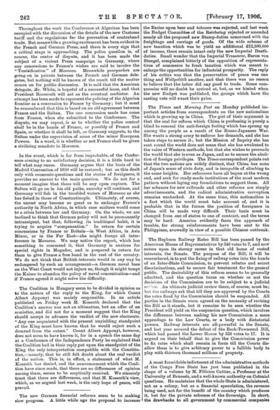The Hepburn Railway Rates Bill has been passed by the
American House of Representatives by 346 votes to 7, and nom; enters upon its stormy career in that old home of vested interests, the Senate. The purpose of the Bill, it will be remembered, is to put the fixing of railway rates into the hands of an Inter-State Commission, to prevent rebates and secret discriminations, and to secure fair treatment for the general public. The desirability of this reform seems to be generally admitted, and the question turns on whether or not the decisions of the Commission are to be subject to a judicial rev'ew. Au ultimate judicial review there, of course, must be; but the railways ask that till they are approved by the Courts the rates fixed by the Commission should be suspended,. All parties in the Senate seem agreed on the necessity of revising the Bill as it stands, but it remains to be seen whether the President will yield on the suspension question, which involves the difference between making his new Commission a mein appendage to the Law Courts, or a body with dictatorial powers. Railway interests are all-powerful in the Senate, and last year secured the defeat of the Each-Townsend Bill, which had passed the Lower House by 326 votes to 17. It is argued on their behalf that to give the Commission power to fix rates which shall remain in force till the Courts dis allow them is to give arbitrary power to a fallible body to play with thirteen thousand millions of property.










































 Previous page
Previous page